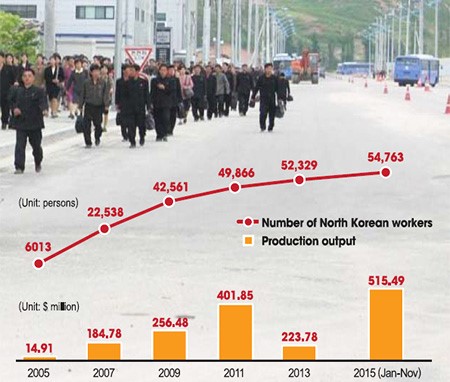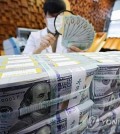- California Assembly OKs highest minimum wage in nation
- S. Korea unveils first graphic cigarette warnings
- US joins with South Korea, Japan in bid to deter North Korea
- LPGA golfer Chun In-gee finally back in action
- S. Korea won’t be top seed in final World Cup qualification round
- US men’s soccer misses 2nd straight Olympics
- US back on track in qualifying with 4-0 win over Guatemala
- High-intensity workout injuries spawn cottage industry
- CDC expands range of Zika mosquitoes into parts of Northeast
- Who knew? ‘The Walking Dead’ is helping families connect
Shutdown takes major toll on firms in Kaeseong
By Park Si-soo
The shutdown of the inter-Korean Kaeseong Industrial Complex in North Korea will take a huge toll on 124 South Korean companies that had operations there despite compensation and aid packages promised by the government.
North Korea ordered small- and medium-sized companies there to remove all their employees from the complex by 5:30 p.m., Thursday, leaving behind their assets, including manufacturing equipment, finished products and raw materials.
They will also face the risk of breaking contracts with thousands of buyers and suppliers if the shutdown continues, which will end up with a wave of damages lawsuits against them.
Listed companies are expected to suffer additional financial damage from declining stock prices or broken ties with investors.
Seoul estimates expected losses stemming from the shutdown at 1 trillion won ($835.4 million), but experts believe the figure will continue to increase as long as the complex remains off-limits.
The South launched a pan-government special task force Thursday committed to helping affected companies.
It will ask state-funded banks and other financial institutes to do everything they can to help the companies survive the unprecedented crisis, including offering new lending and extending loan maturities.
But critics called this a stopgap measure that falls way short of resolving the fundamental problem.
“The shutdown is tantamount to a death sentence,” said Lee Hee-gun, vice president of the association representing South Korean companies in the complex. “Dozens of companies that have manufacturing facilities in Kaeseong will go bankrupt or experience serious financial difficulty within six months.”
He expressed deep-seated distrust of the government, saying it consoled the companies with what he called a “sugar-coated” aid plan in 2013 when the North unilaterally shut the complex for 166 days in reaction to a South Korea-U.S. joint military drill.
“Back then, the government asserted it would help companies with hundreds of billions of won. But what it actually paid to companies was much smaller,” he said. “The government will keep its commitment strong for a while, but it will end up fizzling out.”
Members of the association had an emergency meeting in Seoul, Thursday, denouncing the government’s unexpected closure of the complex and calling for due compensation.
“The most imminent concern is manufacturing equipment and finished products that will be left behind,” said association president Chung Gi-sup. “We were unable to bring it to the South because the government decided on the closure abruptly.”
Chung called on the government to temporarily lift a travel ban imposed Wednesday so that association members will be able to take their assets from the complex to the South.
Municipal governments are poised to play their role in helping affected companies. Gyeonggi Province Governor Nam Kyung-pil said he will cooperate with the central government to help the 38 companies whose headquarters are located in the province.
“We will do everything we can to help them,” Nam said.
Incheon Mayor Yoo Jeong-bok also pledged full-fledged support to help companies headquartered in the city.
















